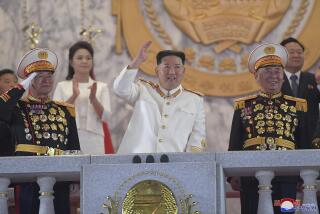Somali Civil War Is Over, Rivals Vow : Peace: Clan leaders embrace in public and thousands cheer. But violence continues, and clashes with U.S. troops result in at least one Somali death.
- Share via
MOGADISHU, Somalia — With U.S. Marine helicopter gunships flying overhead, Somalia’s two main clan leaders told a huge, cheering, singing and dancing throng Monday that this country’s barbarous two-year civil war is over and that the reconciliation has begun.
Gen. Mohammed Farah Aidid and his bitter rival, self-proclaimed interim President Ali Mahdi Mohamed, made the declarations of peace at a massive rally on the Green Line that divided the two camps and the capital.
Given past experience and the lack of specifics to implement Monday’s speeches, declaring an end to the bitter hostilities might be premature. Even as at least 100,000 people here cheered as the once murderous rivals hugged, there were outbreaks of violence on the edges of the rally.
Because the loudspeakers on the platform did not work and the two men spoke against the prevailing wind, few among the crowd heard them. But the masses sang and carried out the rhythmic bobbing Sufi dance in celebration anyway.
After the speeches, hugs and triumphant gestures, some of the crowd, accompanied by a badly out-of-tune band, marched north across the Green Line as a symbol of this city’s unification.
The rally was Mahdi and Aidid’s first public appearance together since the two onetime allies split after the 1991 overthrow of the dictatorship of Mohamed Siad Barre. At least 300,000 people have died in the civil war that followed; more than 1 million Somalis have been forced into exile.
The rally was supposed to lead to removal of barriers marking the Green Line, which separated Aidid’s forces in the southern part of Mogadishu from Mahdi’s clan to the north. But the piles of rubble and makeshift checkpoints remained after the rally. The violence that has plagued both sides of the no-man’s-land continued, even as Mahdi and Aidid pledged peace and goodwill.
While thousands partied in the streets and the leaders proclaimed peace and brotherhood, foreign journalists came under attack as the amount of street violence seemed to increase. Just as the rally began, a camera crew working for Visnews, a British agency, was attacked and robbed by two armed men as it was leaving Mogadishu airport. Nearby U.S. Marines opened fire on the gunmen, killing one; the other escaped with a television camera after spraying the area with automatic-rifle fire. One of the Visnews crew was wounded in the arm.
In a separate incident near the airport, four American servicemen were fired on by two gunmen carrying AK-47s. The soldiers chased the gunmen and killed one. The other escaped, military officers said.
At the rally itself, many reporters were jostled, and a Washington Post photo car was rammed and shot at by several gunmen. A Los Angeles Times reporter was robbed and twice fired upon by two Somalis carrying Russian-made automatic pistols. No one was injured in these incidents, which occurred within sight of the rally.
Such incidents are supposed to stop, with American military officials saying they have begun to extend their occupation into northern Mogadishu and are accelerating and expanding their so-far limited disarmament of both clans and individual gunmen.
U.N. spokesman Farouk Mawlawi said that senior American officials had told him that, starting immediately, U.S. forces will go “full ahead with the disarmament” of anyone carrying “a weapon that can fire more than one shot at a time.” In other words, Mawlawi said, “all automatic weapons.”
He said the policy will apply even to guards hired by reporters and the security forces that protect vehicles and food shipments of relief agencies here. “We were told,” Mawlawi said, “that the relief agencies should inform the American forces whenever they want to move and they will be provided with protection.”
The reconciliation that the clan leaders spoke of Monday was part of a strategy urged on the two sides by Robert B. Oakley, the special U.S. envoy to this troubled nation. Oakley has said the only way to guarantee the security of the international effort to alleviate the suffering of Somalia’s famished millions is to find a political solution to clan rivalries here.
The U.N. official said that U.S. officials have made what he termed a significant shift in their policy. Up to now, this policy has been that while the Marines would disarm the heavily armed pickup trucks used by gunmen, security guards and the warring clans, if they appeared on the streets, the American forces would not disarm the general population.
The Americans have stuck to this position even in the face of strong demands by U.N. Secretary General Boutros Boutros-Ghali, who has argued that the only way to guarantee relief shipments and create political stability in Somalia is by a general disarmament.
“The way the Americans have been expanding disarmament moves them closer to the secretary general’s position,” Mawlawi said in an interview. “We are very pleased.”
Marine Col. Fred Peck, an American military spokesman here, did not go that far, saying the “goal is to get the gunmen (and their heavy weapons) off the streets.” But he added that patrols and occupation will grow and extend because “we have the manpower now. . . . In areas we control, any open display of a weapon, we will treat that person or vehicle as hostile and will confiscate it.”
Meantime, the expansion of the American role in the Somali interior continued Monday, when a combined U.S. Marine and Canadian airborne force entered the city of Belet Huen, the last of eight target areas set out for occupation. There was no opposition, military spokesmen said.
More to Read
Sign up for Essential California
The most important California stories and recommendations in your inbox every morning.
You may occasionally receive promotional content from the Los Angeles Times.













